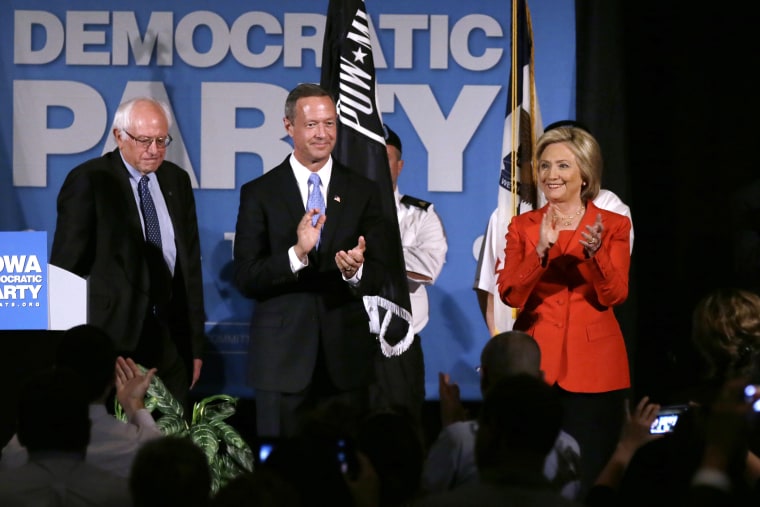There's been a fair amount of 2016 polling out of Iowa lately, and most of it offered fairly good news for Hillary Clinton. The Democratic frontrunner found herself a 34-point lead over Bernie Sanders in the latest Suffolk poll, a 19-point lead in the latest CNN poll, and a 27-point lead in the latest Public Policy Polling survey.
But all of these results will likely be overshadowed by results published over the weekend.
Liberal revolutionary Bernie Sanders, riding an updraft of insurgent passion in Iowa, has closed to within 7 points of Hillary Clinton in the Democratic presidential race. She's the first choice of 37 percent of likely Democratic caucusgoers; he's the pick for 30 percent, according to a new Des Moines Register/Bloomberg Politics Iowa Poll.
The significance of this, as compared to the other recent results, is that the Des Moines Register's polling is generally seen as the gold standard among all Iowa polls.
Among Iowa Republicans, the same survey found Donald Trump leading the GOP pack with 23% support, followed by Ben Carson with 18%. No other candidate reached double digits, though Scott Walker and Ted Cruz tied for third with 8% each, and Jeb Bush and Marco Rubio tied for fifth with 6% each.
There are plenty of interesting angles to kick around, including the narrow margin between Clinton and Sanders, and on the side of the divide, Carson's unusually strong showing. Note, for example, that the retired neurosurgeon, at least in this new poll, has more support than Walker and Cruz combined.
But what got me thinking was a comment from Glen Borger, a Republican pollster, who argued yesterday that one explanation for Sanders' unexpected strength relates to Democratic expectations about the Republican field: "Dems believe even [Sanders] could beat Trump.... And he probably could."
It's an intriguing idea. The argument, in effect, is that Democratic voters -- not just in Iowa, but presumably elsewhere -- are looking at the Republican field and reading the same polls as everyone else. And these same Dem voters, the argument goes, are watching the GOP base rally behind a former reality-show host, which may lead to a calculated strategy.
"If Republicans are going with Trump, maybe we ought not worry too much about electability," many Democrats are thinking, as per the thesis.
But if there's something to this, perhaps the same dynamic applies to Republicans just as much? We already know much of the GOP base is unconcerned with electability, at least for now. It's possible that for many Republican voters, Democrats are choosing between a former Secretary of State, who exercised poor email-server management, to the fascination of the political world, and a socialist senator from Vermont.
Under these circumstances, maybe these same GOP voters are thinking, "We're going to win anyway, so why not rally behind a bombastic developer and a right-wing neurosurgeon?"
To be sure, I'm not entirely prepared to endorse the thesis, and if this does capture what both parties' bases are thinking, those partisans may very well be wrong.
Still, it's an interesting idea to kick around.
